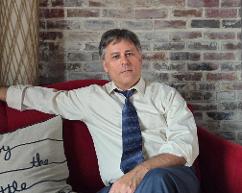Hours before a storm arrives,
I pilfer book spines to see what
catches my eye. I’m beginning
to think what we call wisdom
is little more than stumbling onto
one thing as opposed to something else.
When my father, a towboat pilot, died,
he took with him fifty years of knowing
the river’s changing channel. Three,
maybe four men, knew the whole
of the river as intimately as he did.
Years have drifted on: hours, days,
and one cold February morning when I
thought to ask some ordinary detail
about his childhood, now lost forever.
What can death teach us, though,
that we don’t already know? Wind
turns the rain on a slant, sweeps
both benches from the patio, then
intensifies so that the woods line
a hundred yards away can’t be seen.
It’s strange to think that of all
his mind came to consider
through most of a weary century,
almost none of it was spoken aloud
and even less of it given to a page.
He taught me the current might be
wide, but—far below—the channel
follows its own course, and not always
where you think it should be.

Jeff Hardin is the author of seven collections of poetry, most recently Watermark (Madville Publishing, 2022), A Clearing Space in the Middle of Being (Madville Publishing, 2019), and No Other Kind of World (Texas Review Press, 2017). His work has received the Nicholas Roerich Prize, the Donald Justice Prize, and the X. J. Kennedy Prize. Recent and forthcoming poems appear in The Bennington Review, Laurel Review, Image, Poetry South, Potomac Review, The Southern Review, and many others. He lives and teaches in Tennessee.
